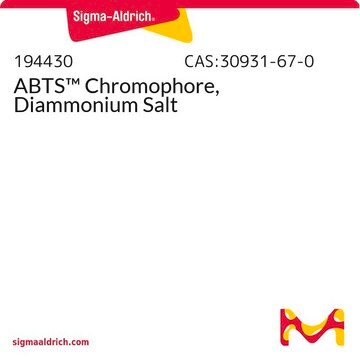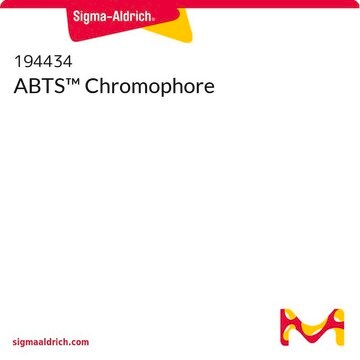11557
2,2′-Azino-bis(3-ethylbenzothiazoline-6-sulfonic acid) diammonium salt
chromogenic, ≥98% (HPLC), powder or crystals
Synonym(s):
AzBTS-(NH4)2, Diammonium 2,2′-azino-bis(3-ethylbenzothiazoline-6-sulfonate)
About This Item
Recommended Products
product name
2,2′-Azino-bis(3-ethylbenzothiazoline-6-sulfonic acid) diammonium salt, ≥98% (HPLC)
Assay
≥98% (HPLC)
form
powder or crystals
impurities
≤6.0% water
solubility
H2O: 10 mg/mL, slightly hazy to clear
storage temp.
2-8°C
SMILES string
[NH4+].[NH4+].CCN1C(\Sc2cc(ccc12)S([O-])(=O)=O)=N\N=C3/Sc4cc(ccc4N3CC)S([O-])(=O)=O
InChI
1S/C18H18N4O6S4.2H3N/c1-3-21-13-7-5-11(31(23,24)25)9-15(13)29-17(21)19-20-18-22(4-2)14-8-6-12(32(26,27)28)10-16(14)30-18;;/h5-10H,3-4H2,1-2H3,(H,23,24,25)(H,26,27,28);2*1H3/b19-17-,20-18-;;
InChI key
OHDRQQURAXLVGJ-AXMZSLBLSA-N
Looking for similar products? Visit Product Comparison Guide
Application
- in the radical scavenging assay to test the antioxidant property of Pinus densiflora bark (PDB) extracts
- to test the antioxidant capacity (AOC) of Aloe vera samples
- as a substrate for streptavidin-horse radish peroxidase (HRPO) in enzyme-linked immunosorbent assay (ELISA)
Other Notes
Storage Class Code
11 - Combustible Solids
WGK
WGK 3
Flash Point(F)
Not applicable
Flash Point(C)
Not applicable
Personal Protective Equipment
Certificates of Analysis (COA)
Search for Certificates of Analysis (COA) by entering the products Lot/Batch Number. Lot and Batch Numbers can be found on a product’s label following the words ‘Lot’ or ‘Batch’.
Already Own This Product?
Find documentation for the products that you have recently purchased in the Document Library.
Customers Also Viewed
Our team of scientists has experience in all areas of research including Life Science, Material Science, Chemical Synthesis, Chromatography, Analytical and many others.
Contact Technical Service








